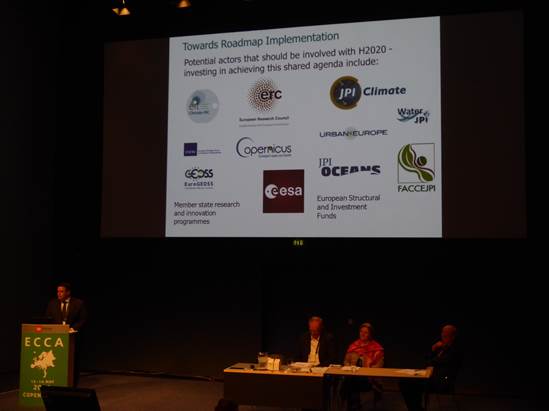Attending the 2nd European Climate Change Adaptation Conference ECCA 12-14 May 2015, Copenhagen, Denmark.
Let me share some insights after the first day:
Adaptation is just waiting for innovative solutions designed with scientific methods and scientific rigor.
Adaption means that we have to face problems with high complexity and uncertainty which makes our knowledge far from precise.
Adaptation does not have to be something negative. See adaptation as innovation opportunities.
Adaptation calls for new concepts (like climate services) and methodologies (like climate adaptation monitoring and evaluation systems).
Adaptation is on the research agenda – and it requires a different way to use research.
Picture taken at a session the first day of ECCA 2015 by Carin Nilsson
Day two of ECCA began with Richard Betts quoting Niels Bohr who said that
“It’s hard to make predictions – especially about the future”
True indeed, but is there anything new about making predictions to support adaptation compared to other predictions tasks? My question was partly answered throughout the day.
“Climate adaptation science” is indeed an area in the interface of research and policy.
The challenge of climate adaptation open up for a market of decision support tools. There is a high demand of information and evaluation support from policy and decision makers.
Even though existing principles for risk assessment and decision making adopted, there is still plenty room for development. Perhaps Climate Adaptation need novel ways to evaluate effectiveness and efficiency of adaptation strategies since the problems face deep uncertainty?
I heard several speakers talking about finding the optimal adaptation strategy or maximising efficiency. Can we really have the aim to optimise when knowledge is unreliable and uncertainty deep?
I found that many agreed on that we should seek solutions robust to uncertainty. There were even decision support tools that take deep uncertainty into account. To this I would like to add that we should also treat uncertainty in a way that is adequate with respect to the epistemic situation in knowledge that is available. That is what my ecca_poster was about.
Now I am going to let the ideas sink in and mature – being very satisfied going to ECCA 2015.
~Ullrika

